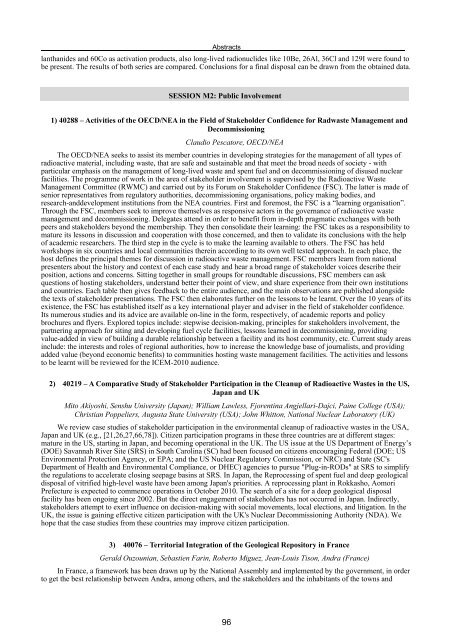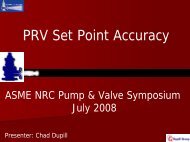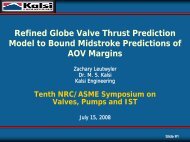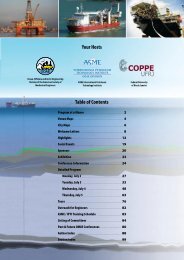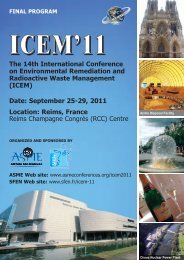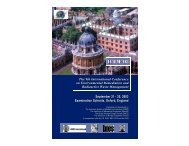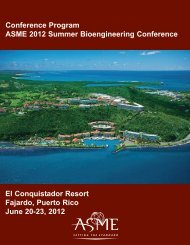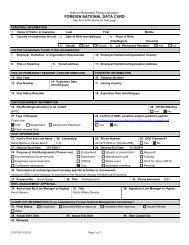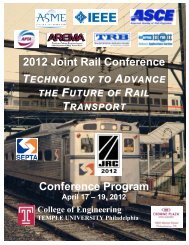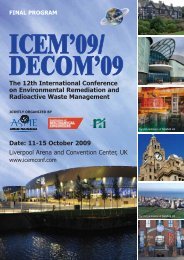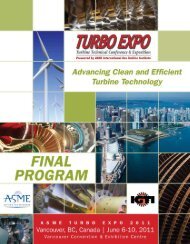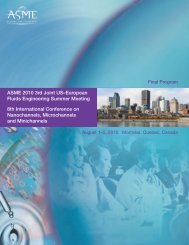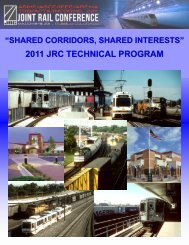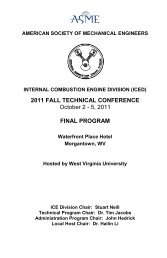The 13th International Conference on Environmental ... - Events
The 13th International Conference on Environmental ... - Events
The 13th International Conference on Environmental ... - Events
You also want an ePaper? Increase the reach of your titles
YUMPU automatically turns print PDFs into web optimized ePapers that Google loves.
Abstracts<br />
lanthanides and 60Co as activati<strong>on</strong> products, also l<strong>on</strong>g-lived radi<strong>on</strong>uclides like 10Be, 26Al, 36Cl and 129I were found to<br />
be present. <str<strong>on</strong>g>The</str<strong>on</strong>g> results of both series are compared. C<strong>on</strong>clusi<strong>on</strong>s for a final disposal can be drawn from the obtained data.<br />
SESSION M2: Public Involvement<br />
1) 40288 – Activities of the OECD/NEA in the Field of Stakeholder C<strong>on</strong>fidence for Radwaste Management and<br />
Decommissi<strong>on</strong>ing<br />
Claudio Pescatore, OECD/NEA<br />
<str<strong>on</strong>g>The</str<strong>on</strong>g> OECD/NEA seeks to assist its member countries in developing strategies for the management of all types of<br />
radioactive material, including waste, that are safe and sustainable and that meet the broad needs of society - with<br />
particular emphasis <strong>on</strong> the management of l<strong>on</strong>g-lived waste and spent fuel and <strong>on</strong> decommissi<strong>on</strong>ing of disused nuclear<br />
facilities. <str<strong>on</strong>g>The</str<strong>on</strong>g> programme of work in the area of stakeholder involvement is supervised by the Radioactive Waste<br />
Management Committee (RWMC) and carried out by its Forum <strong>on</strong> Stakeholder C<strong>on</strong>fidence (FSC). <str<strong>on</strong>g>The</str<strong>on</strong>g> latter is made of<br />
senior representatives from regulatory authorities, decommissi<strong>on</strong>ing organisati<strong>on</strong>s, policy making bodies, and<br />
research-anddevelopment instituti<strong>on</strong>s from the NEA countries. First and foremost, the FSC is a “learning organisati<strong>on</strong>”.<br />
Through the FSC, members seek to improve themselves as resp<strong>on</strong>sive actors in the governance of radioactive waste<br />
management and decommissi<strong>on</strong>ing. Delegates attend in order to benefit from in-depth pragmatic exchanges with both<br />
peers and stakeholders bey<strong>on</strong>d the membership. <str<strong>on</strong>g>The</str<strong>on</strong>g>y then c<strong>on</strong>solidate their learning: the FSC takes as a resp<strong>on</strong>sibility to<br />
mature its less<strong>on</strong>s in discussi<strong>on</strong> and cooperati<strong>on</strong> with those c<strong>on</strong>cerned, and then to validate its c<strong>on</strong>clusi<strong>on</strong>s with the help<br />
of academic researchers. <str<strong>on</strong>g>The</str<strong>on</strong>g> third step in the cycle is to make the learning available to others. <str<strong>on</strong>g>The</str<strong>on</strong>g> FSC has held<br />
workshops in six countries and local communities therein according to its own well tested approach. In each place, the<br />
host defines the principal themes for discussi<strong>on</strong> in radioactive waste management. FSC members learn from nati<strong>on</strong>al<br />
presenters about the history and c<strong>on</strong>text of each case study and hear a broad range of stakeholder voices describe their<br />
positi<strong>on</strong>, acti<strong>on</strong>s and c<strong>on</strong>cerns. Sitting together in small groups for roundtable discussi<strong>on</strong>s, FSC members can ask<br />
questi<strong>on</strong>s of hosting stakeholders, understand better their point of view, and share experience from their own instituti<strong>on</strong>s<br />
and countries. Each table then gives feedback to the entire audience, and the main observati<strong>on</strong>s are published al<strong>on</strong>gside<br />
the texts of stakeholder presentati<strong>on</strong>s. <str<strong>on</strong>g>The</str<strong>on</strong>g> FSC then elaborates further <strong>on</strong> the less<strong>on</strong>s to be learnt. Over the 10 years of its<br />
existence, the FSC has established itself as a key internati<strong>on</strong>al player and adviser in the field of stakeholder c<strong>on</strong>fidence.<br />
Its numerous studies and its advice are available <strong>on</strong>-line in the form, respectively, of academic reports and policy<br />
brochures and flyers. Explored topics include: stepwise decisi<strong>on</strong>-making, principles for stakeholders involvement, the<br />
partnering approach for siting and developing fuel cycle facilities, less<strong>on</strong>s learned in decommissi<strong>on</strong>ing, providing<br />
value-added in view of building a durable relati<strong>on</strong>ship between a facility and its host community, etc. Current study areas<br />
include: the interests and roles of regi<strong>on</strong>al authorities, how to increase the knowledge base of journalists, and providing<br />
added value (bey<strong>on</strong>d ec<strong>on</strong>omic benefits) to communities hosting waste management facilities. <str<strong>on</strong>g>The</str<strong>on</strong>g> activities and less<strong>on</strong>s<br />
to be learnt will be reviewed for the ICEM-2010 audience.<br />
2) 40219 – A Comparative Study of Stakeholder Participati<strong>on</strong> in the Cleanup of Radioactive Wastes in the US,<br />
Japan and UK<br />
Mito Akiyoshi, Senshu University (Japan); William Lawless, Fjorentina Angjellari-Dajci, Paine College (USA);<br />
Christian Poppeliers, Augusta State University (USA); John Whitt<strong>on</strong>, Nati<strong>on</strong>al Nuclear Laboratory (UK)<br />
We review case studies of stakeholder participati<strong>on</strong> in the envir<strong>on</strong>mental cleanup of radioactive wastes in the USA,<br />
Japan and UK (e.g., [21,26,27,66,78]). Citizen participati<strong>on</strong> programs in these three countries are at different stages:<br />
mature in the US, starting in Japan, and becoming operati<strong>on</strong>al in the UK. <str<strong>on</strong>g>The</str<strong>on</strong>g> US issue at the US Department of Energy’s<br />
(DOE) Savannah River Site (SRS) in South Carolina (SC) had been focused <strong>on</strong> citizens encouraging Federal (DOE; US<br />
Envir<strong>on</strong>mental Protecti<strong>on</strong> Agency, or EPA; and the US Nuclear Regulatory Commissi<strong>on</strong>, or NRC) and State (SC's<br />
Department of Health and Envir<strong>on</strong>mental Compliance, or DHEC) agencies to pursue "Plug-in-RODs" at SRS to simplify<br />
the regulati<strong>on</strong>s to accelerate closing seepage basins at SRS. In Japan, the Reprocessing of spent fuel and deep geological<br />
disposal of vitrified high-level waste have been am<strong>on</strong>g Japan's priorities. A reprocessing plant in Rokkasho, Aomori<br />
Prefecture is expected to commence operati<strong>on</strong>s in October 2010. <str<strong>on</strong>g>The</str<strong>on</strong>g> search of a site for a deep geological disposal<br />
facility has been <strong>on</strong>going since 2002. But the direct engagement of stakeholders has not occurred in Japan. Indirectly,<br />
stakeholders attempt to exert influence <strong>on</strong> decisi<strong>on</strong>-making with social movements, local electi<strong>on</strong>s, and litigati<strong>on</strong>. In the<br />
UK, the issue is gaining effective citizen participati<strong>on</strong> with the UK's Nuclear Decommissi<strong>on</strong>ing Authority (NDA). We<br />
hope that the case studies from these countries may improve citizen participati<strong>on</strong>.<br />
3)� 40076 – Territorial Integrati<strong>on</strong> of the Geological Repository in France<br />
Gerald Ouzounian, Sebastien Farin, Roberto Miguez, Jean-Louis Tis<strong>on</strong>, Andra (France)<br />
In France, a framework has been drawn up by the Nati<strong>on</strong>al Assembly and implemented by the government, in order<br />
to get the best relati<strong>on</strong>ship between Andra, am<strong>on</strong>g others, and the stakeholders and the inhabitants of the towns and<br />
96


